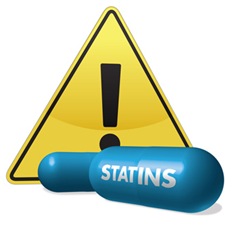 Print This Post
Print This Post
Statins Proven To Cause… Umm, I Can’t Remember!
Written by Wellness Club on October 31, 2013 – 3:08 pm -Part VIII of a multi-installment series on cholesterol and the dangers of statin drugs.
Part ViI can be found here: Statin Drugs Proven To Increase Risk Of Cataracts
Part VI can be found here: Statins Proven To Cause Increased Injuries
Part V can be found here: Saturated Fats Are NOT Bad For You – Here’s PROOF
Part IV can be found here: Cholesterol: Life-Giving Or Life-Threatening?
Part III can be found here: New Research Into Statin Drug Memory Loss
Part II can be found here: Trade Your High Cholesterol For Diabetes!
Part I can be found here: Lower Your Cholesterol – Lose Your Marbles?
By Nurse Mark
 Just in case you needed more reason to avoid statin drugs, there is a most recent research article showing that pravastatin (brand name Pravacol) causes measurable impairment of memory in rats.
Just in case you needed more reason to avoid statin drugs, there is a most recent research article showing that pravastatin (brand name Pravacol) causes measurable impairment of memory in rats.
If this is a surprise to anyone it shouldn’t be – users of the drugs have been reporting problems like this for years, and Big Pharma has been poo-poo’ing and dismissing their complaints for just as long.
One of the more notable people to report this problem is Duane Graveline MD – a former USAF Flight Surgeon and former NASA Astronaut. Dr. Graveline, a retired family doctor was prescribed statins by his doctors at the Johnson Space Center in Houston. He then experienced not one, but two episodes of profound transient global amnesia, recovering from the episodes each time when he stopped taking the statins.
Graveline has been attacked and villified by Big Pharma and conventional medicine. He has been labeled a “quack” but it looks like there is now even solid research to support his claims.
Researchers from the School of Physiology and Pharmacology at University of Bristol, in Bristol, England recently completed a study where rats were given two kinds of statin drug – pravastatin and atorvastatin and then tested for their ability to remember and perform tasks. Those rats given the pravastatin were found to be significantly impaired.
The good news is that the effects were reversible – the rats recovered their memory when the drug was no longer given.
In the words of the authors of the study:
In conclusion, we have demonstrated that chronic treatment with pravastatin impairs recognition memory in normal rats. We also found impairments in working memory towards the end of treatment although this effect was less clear and was limited by the duration of treatment used in this study. Both effects observed were fully reversed following cessation of treatment. Overall, these findings support clinical observations that statins have adverse cognitive effects in certain patients undergoing long-term treatment. This study provides some of the first data obtained from animal studies suggesting statin treatment can impair cognitive function in a reversible manner in normal animals. The deficits observed with pravastatin were present in both models suggesting impaired working memory and/or attention, impaired cognitive flexibility and impaired recognition memory.
So… Your memory “ain’t what it used to be”? Maybe it’s not “just ’cause you’re getting older”!
Have a look at the medicines you are taking.
Maybe that drug that is supposed to be “saving your heart” from “high cholesterol” is really just stealing your memories.
References:
Dr. Duane Graveline website: http://www.spacedoc.com/statin_amnesia_true_cost.html
Study finds link between commonly prescribed statin and memory impairment: http://www.eurekalert.org/pub_releases/2013-09/uob-sfl092513.php
Chronic Pravastatin but Not Atorvastatin Treatment Impairs Cognitive Function in Two Rodent Models of Learning and Memory: http://www.plosone.org/article/info%3Adoi%2F10.1371%2Fjournal.pone.0075467
Related Posts
 Print This Post
Print This Post

Posted in Cholesterol, Drugs and Alternatives, Heart and Circulation | Comments Off




































